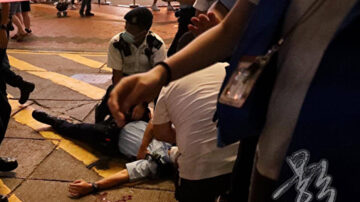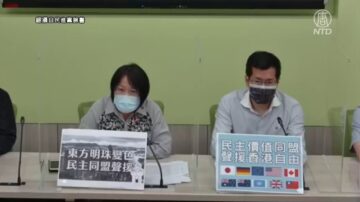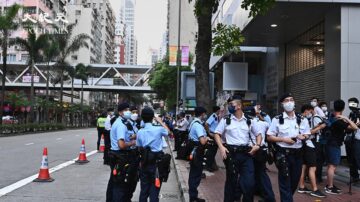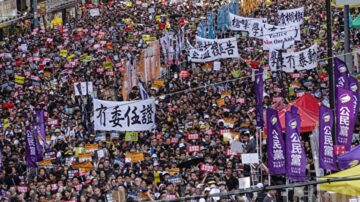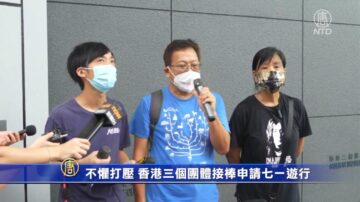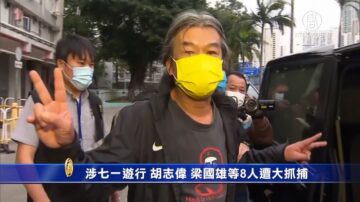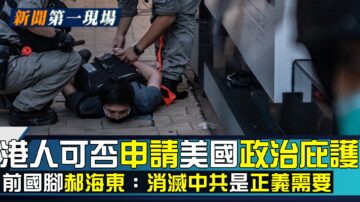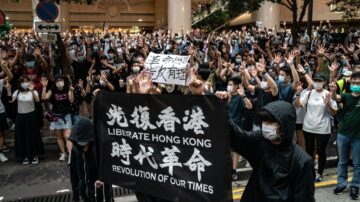【新唐人2012年7月3日讯】7月1号是香港回归大陆的15周年纪念日。大批香港市民走上街头,抗议北京当局对香港民主与自由的压制。而根据海外媒体消息,大陆政法委与宣传部门曾在3年前制定一项计划,意图在香港加强分化打击和宣传灌输,对香港实施更有效的控制。虽然这个计划没有获得政治局通过,但仍然被中央维稳办与政法委所推行。
海外中文媒体报导,在香港参加“七.一 ”安保任务的广东维稳办刘姓处长透露,这项计划包括:对香港的异议人士进行分化与控制,切断大陆维权人士与香港的联系,特别是不让香港的维权人士进行抗议示威、造成大的影响。
对此,“中国社会民主党中央委员会”主持人刘因全向《新唐人》分析指出,中共一直竭力强化一党专制,不希望有任何的力量影响到它的专制统治。
“中国社会民主党中央委员会”主持人刘因全:“ 它(中共)担心,如果对香港失控,香港会成为推动中国改革的一个窗口。大量的中国人、大陆人到香港去,受香港的影响,回去以后会推动中国的民主化。”
中央政法委推行的这项计划还包括:对香港的亲共媒体进行扶持,对于关注与支持大陆民众进行维权等活动的媒体,则进行压制,禁止它们在大陆采访。
对此,香港《开放》杂志总编辑金钟表示,自从1997年香港实行所谓“ 一国两制”之后,中共对香港媒体使用了很多方法来进行控制。
香港《开放》杂志总编辑金钟:“所以媒体的声音,独立的、勇敢的声音就比过去少了,但是还不是完全没有,受到有这样的影响。”
《法国国际广播电台》报导指出,“一国”凌驾于“两制”之上导致的媒体自律和人权问题,让港人非常担忧。台湾陆委会的一份调查报告显示,大陆驻香港机构介入香港选举的传闻比往年更多,香港媒体自我审查、不愿批评北京当局的现象比往年也更为严重。
6月30号上午,中共总书记胡锦涛在九龙参观,《蘋果日报》记者问胡锦涛,有没有听见港人要求平反六四的意愿,结果被4名便衣警察以记者“讲话太大声”为由架走盘查。这引来各界对香港警方的谴责。
“香港记者协会”主席麦燕庭指责警方的做法是践踏新闻自由,要求警方停止大陆化的手法。
“香港记者协会”主席麦燕庭:“因为大家距离很远,你不喊出来,胡锦涛根本听不见那个问题。所以其他记者也有喊问题,但是单单是这一个问胡锦涛‘有没有听见香港人要求平反六四的声音?’这个提问的记者,给扣留了15分钟,我们就觉得警方是有政治审查。”
据报导,广东维稳办的刘姓处长还透露,按照香港《基本法》,下一届特首就要实行直选,立法会也要直选,北京对此感觉压力很大。因此,如何对港人灌输所谓“爱国主义”教育,笼络民心,成为北京未来5年的主要任务。
麦燕庭:“从最近香港大学的民意调查看,我觉得这个民心回归的事情,它(中共)还没有做成功。而且我觉得,从香港大学的那个民意调查看来,尤其是年轻人,对中国(中共)政府的认同感是越来越低,是创回归以来的新低。”
麦燕庭强调,现在的香港人越来越关注人权、自由和法治,如果中共当局不顺应民心、在这些方面有所改善,根本不可能得到香港民众的认同。
采访/刘惠 编辑/李谦 后制/朱娣
Beijing’s Plot Against Hong Kong’s Direct Election Exposed
The 1st of July is the 15th anniversary of Hong Kong’s
returning to Chinese rule from British rule.
A large number of Hong Kong‘s citizens took to the streets,
protesting the Chinese Communist Party’s suppression
of local democracy and freedom.
Overseas media have exposed a plot made three years ago
by the Central Political and Legislative Affairs Committee (PLAC) and the propaganda department.
The scheme aims to control Hong Kong more effectively
by reinforcing disintegration, crackdown and propaganda.
The plan was said to have failed to get passed by the Politburo,
but was still carried out by the Central PLAC and Stability Preservation Office.
Mr. Liu, director of Stability Preservation Office Guangdong
branch, revealed details of the scheme to overseas media.
Liu took part in security preparations in Hong Kong on July 1st.
The plot was reported to have covered differentiating
between and controlling of Hong kong dissidents,
cutting off the mainland activists’ connections with
Hong Kong;
Especially, preventing the Hong Kong human rights activists’
protests and reducing the impact.
Chair of the Social Democratic Party of China, Liu Yinquan,
comments on the issue.
The CCP has long been trying to strengthen its one-party
rule, to avoid infiltration by other influences, says Liu.
Liu Yinquan: "It (the CCP) is afraid of losing control of
Hong Kong. If out of control, Hong Kong would become a window to advance China's reform.
Influential mainland Chinese would then go to Hong Kong,
being influenced themselves while staying there.
They would play active roles for China’s democratization
when going back to the mainland."
The Central PLAC’s plot also includes supporting
Hong Kong’s pro-CCP media outlets;
slapping down the media that sides with the mainland rights
defense and banning their interviews on the mainland.
Jin Zhong, chief editor of Hong Kong’s Open magazine, notes
that since the "one country, two systems" model started in 1997,
the CCP has curbed Hong Kong’s media through various ways.
Jin Zhong: "That’s why there are fewer independent and
brave media voices compared to the past.
It’s not entirely disappeared yet,
but has suffered from such influences.”
RFA comments that the fact of "one country" overriding
the "two systems" has provoked issues
like Hong Kong media’s self-censorship and human rights.
That has made Hong Kong citizens feel increasingly fearful.
A survey of Mainland Affairs Council (Taiwan) shows that
mainland institutions stationed in Hong Kong were reported
to be getting more involved in local elections than in
previous years.
Hong Kong media shows more leaning to self-censorship
and reluctance in criticizing Beijing authorities.
On June 30, a journalist of the Apple Daily questioned
the CCP President Hu Jintao who was visiting Kowloon.
“Have you heard that Hong Kong people hope for a redress of
the June 4 incident?”
The journalist was forcibly removed by plainclothes police
for “loudly disrupting order.”
The event sparked condemnation from all sectors of society
at Hong Kong’s police headquarters.
Yin-Ting Mak, president of the Hong Kong Journalists
Association, accused police of trampling on press freedom.
She demanded a stop be put to mainland interference
in Hong Kong.
Yin-Ting Mak: "Hu Jintao was at a distance from journalists,
and wouldn’t be heard if the question was not shouted out.
Other journalists also shouted out the questions to him,
but only the one asking about redress of the June 4 incident
was detained for 15 minutes. The police conducted censorship.”
Reportedly, Guangdong Stability Preservation Office director,
Mr. Liu, also revealed that under great pressure,
the Beijing regime worries about the upcoming direct election
of the next-term Chief Executive and Legislative Council.
How to instill the CCP’s "patriotic" education and how to
win over the Hong Kong people have become its main task in the last five years.
Yin-Ting Mak: "The University of Hong Kong’s recent poll
shows the CCP) failed in getting the population's support.
Especially Hong Kong’s young people, whose sense of
approval of the CCP is getting lower and lower,
it has now reached it’s lowest level
since Hong Kong’s return to CCP government.”
Yin – Ting Mak stresses that the people of Hong Kong are
Showing increasing concern over human rights, freedom and the rule of law.
She warns that if the CCP still refuses to comply with public
aspiration by improving on these issues.
It will never be recognized by the people of Hong Kong.
海外中文媒体报导,在香港参加“七.一 ”安保任务的广东维稳办刘姓处长透露,这项计划包括:对香港的异议人士进行分化与控制,切断大陆维权人士与香港的联系,特别是不让香港的维权人士进行抗议示威、造成大的影响。
对此,“中国社会民主党中央委员会”主持人刘因全向《新唐人》分析指出,中共一直竭力强化一党专制,不希望有任何的力量影响到它的专制统治。
“中国社会民主党中央委员会”主持人刘因全:“ 它(中共)担心,如果对香港失控,香港会成为推动中国改革的一个窗口。大量的中国人、大陆人到香港去,受香港的影响,回去以后会推动中国的民主化。”
中央政法委推行的这项计划还包括:对香港的亲共媒体进行扶持,对于关注与支持大陆民众进行维权等活动的媒体,则进行压制,禁止它们在大陆采访。
对此,香港《开放》杂志总编辑金钟表示,自从1997年香港实行所谓“ 一国两制”之后,中共对香港媒体使用了很多方法来进行控制。
香港《开放》杂志总编辑金钟:“所以媒体的声音,独立的、勇敢的声音就比过去少了,但是还不是完全没有,受到有这样的影响。”
《法国国际广播电台》报导指出,“一国”凌驾于“两制”之上导致的媒体自律和人权问题,让港人非常担忧。台湾陆委会的一份调查报告显示,大陆驻香港机构介入香港选举的传闻比往年更多,香港媒体自我审查、不愿批评北京当局的现象比往年也更为严重。
6月30号上午,中共总书记胡锦涛在九龙参观,《蘋果日报》记者问胡锦涛,有没有听见港人要求平反六四的意愿,结果被4名便衣警察以记者“讲话太大声”为由架走盘查。这引来各界对香港警方的谴责。
“香港记者协会”主席麦燕庭指责警方的做法是践踏新闻自由,要求警方停止大陆化的手法。
“香港记者协会”主席麦燕庭:“因为大家距离很远,你不喊出来,胡锦涛根本听不见那个问题。所以其他记者也有喊问题,但是单单是这一个问胡锦涛‘有没有听见香港人要求平反六四的声音?’这个提问的记者,给扣留了15分钟,我们就觉得警方是有政治审查。”
据报导,广东维稳办的刘姓处长还透露,按照香港《基本法》,下一届特首就要实行直选,立法会也要直选,北京对此感觉压力很大。因此,如何对港人灌输所谓“爱国主义”教育,笼络民心,成为北京未来5年的主要任务。
麦燕庭:“从最近香港大学的民意调查看,我觉得这个民心回归的事情,它(中共)还没有做成功。而且我觉得,从香港大学的那个民意调查看来,尤其是年轻人,对中国(中共)政府的认同感是越来越低,是创回归以来的新低。”
麦燕庭强调,现在的香港人越来越关注人权、自由和法治,如果中共当局不顺应民心、在这些方面有所改善,根本不可能得到香港民众的认同。
采访/刘惠 编辑/李谦 后制/朱娣
Beijing’s Plot Against Hong Kong’s Direct Election Exposed
The 1st of July is the 15th anniversary of Hong Kong’s
returning to Chinese rule from British rule.
A large number of Hong Kong‘s citizens took to the streets,
protesting the Chinese Communist Party’s suppression
of local democracy and freedom.
Overseas media have exposed a plot made three years ago
by the Central Political and Legislative Affairs Committee (PLAC) and the propaganda department.
The scheme aims to control Hong Kong more effectively
by reinforcing disintegration, crackdown and propaganda.
The plan was said to have failed to get passed by the Politburo,
but was still carried out by the Central PLAC and Stability Preservation Office.
Mr. Liu, director of Stability Preservation Office Guangdong
branch, revealed details of the scheme to overseas media.
Liu took part in security preparations in Hong Kong on July 1st.
The plot was reported to have covered differentiating
between and controlling of Hong kong dissidents,
cutting off the mainland activists’ connections with
Hong Kong;
Especially, preventing the Hong Kong human rights activists’
protests and reducing the impact.
Chair of the Social Democratic Party of China, Liu Yinquan,
comments on the issue.
The CCP has long been trying to strengthen its one-party
rule, to avoid infiltration by other influences, says Liu.
Liu Yinquan: "It (the CCP) is afraid of losing control of
Hong Kong. If out of control, Hong Kong would become a window to advance China's reform.
Influential mainland Chinese would then go to Hong Kong,
being influenced themselves while staying there.
They would play active roles for China’s democratization
when going back to the mainland."
The Central PLAC’s plot also includes supporting
Hong Kong’s pro-CCP media outlets;
slapping down the media that sides with the mainland rights
defense and banning their interviews on the mainland.
Jin Zhong, chief editor of Hong Kong’s Open magazine, notes
that since the "one country, two systems" model started in 1997,
the CCP has curbed Hong Kong’s media through various ways.
Jin Zhong: "That’s why there are fewer independent and
brave media voices compared to the past.
It’s not entirely disappeared yet,
but has suffered from such influences.”
RFA comments that the fact of "one country" overriding
the "two systems" has provoked issues
like Hong Kong media’s self-censorship and human rights.
That has made Hong Kong citizens feel increasingly fearful.
A survey of Mainland Affairs Council (Taiwan) shows that
mainland institutions stationed in Hong Kong were reported
to be getting more involved in local elections than in
previous years.
Hong Kong media shows more leaning to self-censorship
and reluctance in criticizing Beijing authorities.
On June 30, a journalist of the Apple Daily questioned
the CCP President Hu Jintao who was visiting Kowloon.
“Have you heard that Hong Kong people hope for a redress of
the June 4 incident?”
The journalist was forcibly removed by plainclothes police
for “loudly disrupting order.”
The event sparked condemnation from all sectors of society
at Hong Kong’s police headquarters.
Yin-Ting Mak, president of the Hong Kong Journalists
Association, accused police of trampling on press freedom.
She demanded a stop be put to mainland interference
in Hong Kong.
Yin-Ting Mak: "Hu Jintao was at a distance from journalists,
and wouldn’t be heard if the question was not shouted out.
Other journalists also shouted out the questions to him,
but only the one asking about redress of the June 4 incident
was detained for 15 minutes. The police conducted censorship.”
Reportedly, Guangdong Stability Preservation Office director,
Mr. Liu, also revealed that under great pressure,
the Beijing regime worries about the upcoming direct election
of the next-term Chief Executive and Legislative Council.
How to instill the CCP’s "patriotic" education and how to
win over the Hong Kong people have become its main task in the last five years.
Yin-Ting Mak: "The University of Hong Kong’s recent poll
shows the CCP) failed in getting the population's support.
Especially Hong Kong’s young people, whose sense of
approval of the CCP is getting lower and lower,
it has now reached it’s lowest level
since Hong Kong’s return to CCP government.”
Yin – Ting Mak stresses that the people of Hong Kong are
Showing increasing concern over human rights, freedom and the rule of law.
She warns that if the CCP still refuses to comply with public
aspiration by improving on these issues.
It will never be recognized by the people of Hong Kong.

